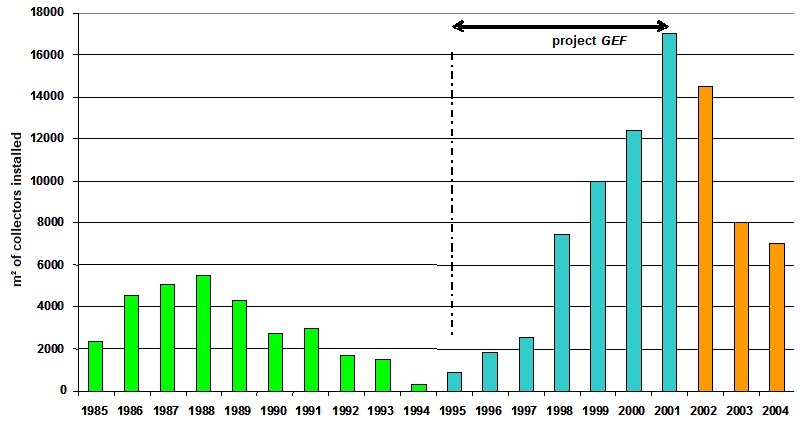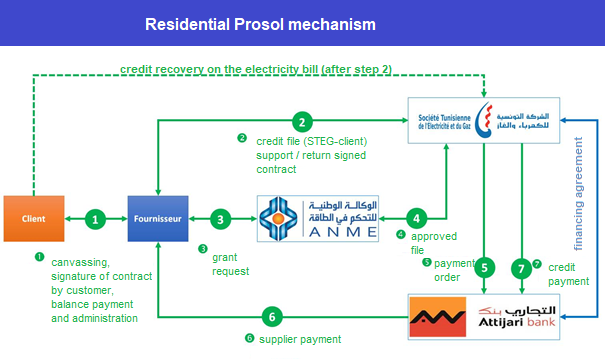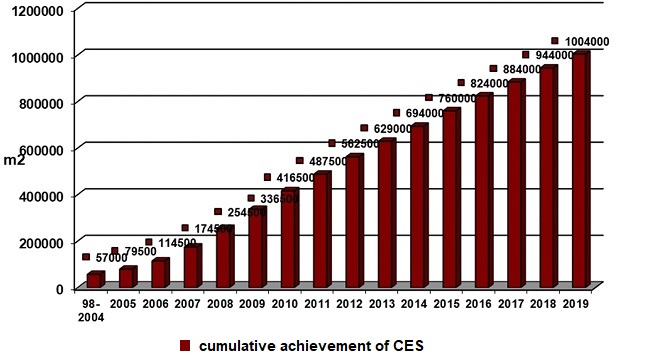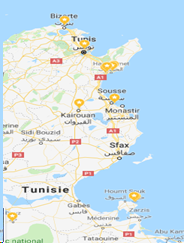Introduction
Abundant hours of sunshine are one of the benefits of Tunisia’s geographical location. Solar energy is therefore an obvious choice for meeting the country’s fundamental energy needs.
Solar water heating (SWH) is one of the most popular ways of harnessing solar energy.
Evolution of the Solar Water Heating Market in Tunisia
Solar Water Heating (chauffe-eau solaire – CES) is today, a technically and commercially mature technology, and one that is well adapted to the needs of Tunisian consumers. Indeed, many Tunisian households have been using SWH to provide domestic hot water for more than thirty years.
The Tunisian experience of installing SWH began in the 1980s, through the Société Public Serept Energie Nouvelle (SEN) with the domestic production of SWH systems.
Marketing of SWH was supported by a loan mechanism for consumers, with a seven-year payback period; payments were collected by STEG (the Société Tunisienne de l’Électricité et du Gaz – the Tunisian Company of Electricity and Gas ) through a surcharge on consumers’ electricity bills.
Due to technological problems, the market experienced a marked decrease from around 5,000 m² per year of systems installed in the late 1980s, to a few hundred m² in the mid-1990s.
In 1995, thanks to Global Environment Facility(GEF) financing, the Tunisian Government launched an ambitious programme to revitalize the market, aiming at the installation of 50,000 m² of capacity by 2003. The programme was based on a simple subsidy of up to 35% of the purchase price, supported by quality monitoring procedures aimed at restoring consumer confidence.
This programme helped revive the market, raising the profile of SWH technology and creating a network of local installers. Annual installations increased from a few hundred m² in 1995 to around 17,000 m² in 2001.
The project ended at the end of 2001 with the exhaustion of the allocated funds (US$6.6 million). This led to a new decline in the Tunisian SWH market, with annual installations decreasing from 17,000 m² in 2001 to around 750 m² in 2004.

It is clear that an adequate and sustainable funding mechanism is necessary for the development of this sector in Tunisia.
In 2005, the Tunisian State launched the ambitious PROSOL programme as part of its national energy management programme.
Aims of the PROSOL programme
The PROSOL programme aims to achieve a total installed area of 1.3 million m² by 2020 and 2.85 million m² by 2030, broken down as follows:
| Installed area ‘000 m2 | End 2015 | 2016-2020 | 2021-2025 | 2026-2030 | TOTAL |
|---|---|---|---|---|---|
| Residential Sector | 703 | 530 | 600 | 700 | 2533 |
| Tertiary Sector | 18 | 26 | 56 | 100 | 200 |
Industrial Sector | – | 14 | 55 | 81 | 150 |
TOTAL | 721 | 570 | 711 | 881 | 2883 |
The annual growth of solar collector installations is shown in the graph below. It should be noted that just 60,000m² of solar collectors were installed in 2018, i.e. 60% of the objectives set for that year:
Review of the Achievements of PROSOL
Since its start in 2005, the achievements of the PROSOL programme in Tunisia have gradually increased.
Between 2005 and 2019, the PROSOL programme achieved 85% of the annual objectives set for this period, i.e. 900,000 m² of installation.
This change of scale is due to improvements in the PROSOL procedures aimed at removing constraints – including the departure of former suppliers and the introduction of new lines of credit – in order to promote lower prices and reduce consumers’ initial outlay. The improvements are also aimed at reducing the red tape involved in the purchase and installation of SWH systems.
To this end, two agreements were signed, the first being between STEG and the Attijari Bank. This agreement stipulates that the bank will undertake to grant loans to purchasers of SWH installations within funding limits of:
- approximately 117 million DT for the period 2007-2011
- 126 million DT for the period 2012-2016
- 179 million DT during the period 2017-2021
The agreement also stipulates that STEG will guarantee repayments according to a fixed schedule and independently of deductions made to consumers’ electricity bills.
The second agreement between ANME and STEG defines the programme’s management procedures and the responsibilities of each party to the agreement.
Residential Solar Energy
In order for domestic Solar Water Heating (SWH) to enter the market and develop sustainably and appropriately, experience in Tunisia has shown that specific measures need to be adopted in terms of finance, organization, procedures and quality control.
The financial measures implemented within the framework of the PROSOL programme address the need to remove the two main obstacles facing the final consumer: the burden of the initial investment and the long payback time compared to other, conventional technologies.
This financial mechanism is based on two principal devices, used in tandem:
- Each purchase of SWH benefits from a public subsidy, originally through the National Energy Management Fund (the Fonds National de Maîtrise de l’Energie) created for this purpose in 2005, and currently from the Energy Transition Fund (Fonds de Transition Energétique – FTE). This subsidy results in a reduced payback time for the end consumer
- 200DT for SWH with a capacity of 200 litres or less, and with a surface area ranging from 1 m² to 3 m²
- 400DT for SWH with a capacity of 300 litres or more, with a surface area ranging from 3 m² to 7 m²
- Loans are granted to the consumer, repayable over a five-year period, with debt recovery assured via invoicing from STEG (the Société Tunisienne de l’Électricité et du Gaz – the Tunisian Company of Electricity and Gas). Loans are available in the following amounts: 950 DT, 1150 DT, 1350 DT, 1450 DT
At the institutional level, the PROSOL programme involved the participation of all the principal organizations concerned directly and indirectly with the programme:
- ANME (l’Agence Nationale pour la Maîtrise de l’Energie – the National Agency for Energy Conservation), leader of the project, with responsibility for establishing and maintaining the programme, through a specific project team
- STEG, which ensures the repayment, via consumers’ electricity bills, of the bank loans
- The Bank, which grants loans to consumers (recoverable through STEG) and pays suppliers according to a fixed schedule
- The National Trade Union Chamber for Renewable Energy (the CNSEnR – la Chambre Nationale Syndicale des Énergies Renouvelables) which represents suppliers and ensures professional development through training, management and assistance to suppliers
- The suppliers and installers who ensure the manufacture or import of equipment in accordance with specifications and install them as required,
The PROSOL programme is organized through a set of procedures detailed in a notebook procedure. In essence, these procedures are as described in the flow diagram below:

For the implementation of these procedures, agreements have been signed between ANME and STEG, as well as between STEG and the Bank. These agreements specify the deadlines for processing accounts and the payment dates for loans and grants. The management of the programme is fully computerized.
One of the prime objectives of the PROSOL Tunisia programme is to promote the installation of high quality SWHs. This objective is pursued through the following measures:
- Establishing a list of criteria for supplier eligibility
- Establishing a list of criteria for installer eligibility
- Establishing a list of technical specifications, determining minimum technical and thermal performance for SWH installations
- Setting up a system of unannounced inspection visits for installers and suppliers
- Establishing a quality control approach for QUALISOL installations, similarly for Key mark installations, and SHAMCI for SWH equipment
ADOPTION AND MARKET DEVELOPMENT (Market adoption)
The PROSOL programme has made it possible to create a real change of scale in the SWH market in Tunisia. Market development indicators continue to improve as the programme progresses:
Programme Development :
The programme experienced significant progress during its first years, achieving an annual rate of 80,000 m² of panels installed each year since 2008. This has led to a cumulative installation of one million m² in 2019, as shown in the diagram below:

Development of Supply :
The development of the SWH market in Tunisia has generated a significant increase in supply channels, which currently consists of:
- 53 eligible suppliers
- 1,200 approved installers, including 350 QUALISOL eligible installers
- 250 certified SWH models
Industrial Base :
In terms of industrial integration, the PROSOL programme was able to establish a network of local manufacturers. The market share of these ten local manufacturers amounts to 95% of all SWHs installed under the programme; the remaining 5%, are imported from outside countries, mainly Europe.
Impact on Job Creation :
The PROSOL programme has been an increasingly important motor for job creation: 750 direct jobs and more than 5,000 indirect jobs have been created through the programme.
Indeed, in all areas, suppliers were required to engage small installation companies in order to provide better local services (of information, advice, maintenance, awareness).
PROSOL has Consolidated Tunisian Leadership in Solar Thermal Heating (Leadership position)
The PROSOL programme has become a national benchmark for developing other sectors, such as PROSOL Electric, which also started up in 2010. It also has a regional and international profile: in 2010, for example, the United Nations Environment Programme (UNEP) organized a workshop in Tunisia to which it invited representatives from six nations (including Chile, India, Lebanon and Mexico) in order to develop similar programmes in those countries. In 2009, the RCREEE (the Regional Center for Renewable Energy and Energy Efficiency) invited representatives from Arab states in the MENA region to Tunisia to discuss ways of learning from the Tunisian experience when developing the SWH market in their own countries.
Furthermore, the PROSOL programme aims to achieve sustainability for the various organizations involved, on all levels – including financial, economic and technical:
- For the State, the financial support it provides for SWH will not mean an additional budgetary liability, since any public subsidy for SWH is largely offset by the reduced amount of subsidy needed for the consumption of LPG for domestic hot water heating
- For the banking sector, the implementation of the PROSOL programme has made it possible to create a large overall loan portfolio. This portfolio is of high quality, given its low risk, due to the automatic repayment of loans through consumers’ electricity bills
- For suppliers, it is obvious that the PROSOL programme constitutes a unique business opportunity, given the volume of business it generates on the one hand and, the high visibility it offers those enterprises participating in the programme on the other
- For consumers, the programme provides improved home comfort through the delivery of abundant hot water, on particularly advantageous payment terms
- For society in general, the programme reduces the need for large outflows of foreign currency and helps to create jobs in the industrial sector and local service economy
Finally, ANME plays a key regulatory and monitoring role with the aim of protecting the interests of all stakeholders. The QUALISOL and Solar Key mark quality approach that ANME is implementing in collaboration with the various participants has the following objectives:
- Protecting the consumer and purchaser of SWH
- Organizing the SWH sector and protecting the market against the importation of poor quality products and goods that don’t meet international standards
- Protecting and assisting the development of local manufacturing industry
- Enabling Tunisian industry to offer products that meet international standards for export
To find out how to become a qualified supplier or installer under the PROSOL programme, download the PROSOL eligibility specifications.
To acquire a solar water heater and benefit from the advantages of the PROSOL programme, download the list of qualified PROSOL suppliers and contact one or more of those on the list,
To get an idea of PROSOL project management procedures and the role of each provider, download the PROSOL residential programme procedure manual.
- Un Total de 35000 m² de capteurs solaires ont été installés dans le secteur du tertiaire depuis le lancement du projet en 2009, réalisant une économie d’énergie estimée à 52,5 Ktepdurant la durée de vie des installations.
- Installations solairesthermiques collectivesont été réalisées dans des hôtels totalisant une surface de4460 m² de capteurs
La carte ci-dessous indique l’emplacement des installations solaires les plus importantes en termes de nombre de capteurs

- 500 ingénieurs, cadres et techniciens ont été formés sur les aspects de conception, d’installation, d’exploitation et de maintenance des installations solaires thermiques collectives
- 18 Bureaux d’études sont éligibles au programme (voir la liste dans la section téléchargements)
- 10 Entreprises opérant desinstallations forcées
- Plus que 50 fournisseurs pour les installations formées de chauffe-eau solaires éligibles
- 04 Bureaux de contrôle éligibles
- 53 capteurs éligibles
- 02 centres de test équipés et en cours d’accréditation (CTMCCV et CRTEn)
